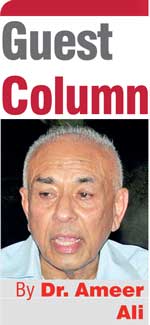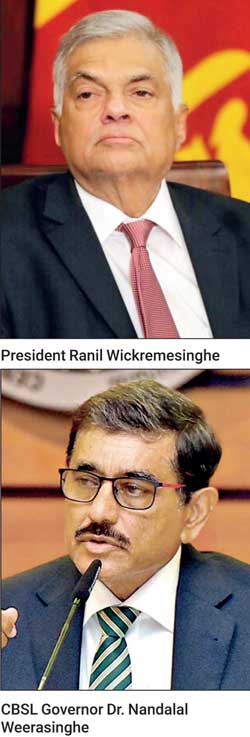Tuesday Feb 17, 2026
Tuesday Feb 17, 2026
Saturday, 1 July 2023 00:05 - - {{hitsCtrl.values.hits}}
 The Governor of CBSL Dr. Nandalal Weerasinghe, in view of the forthcoming Domestic Debt Restructuring (DDR) process and speculations surrounding it, had taken advantage of the five days extended bank holiday period to reassure the country’s financial community that there would be no reduction in either the deposits placed by customers in the financial institutions or interest rates paid on them and that the stability of the financial system would be ensured through what he called earlier as “voluntary optimisation”. This announcement should be considered more as a measure to prevent panic within the financial community, which if eventuates could lead to a run on the banks and collapse of the financial system, rather than a solid guarantee that there would be no adverse impact at all to domestic financial institutions, and that everything would be back to normal at the end of the restructuring exercise.
The Governor of CBSL Dr. Nandalal Weerasinghe, in view of the forthcoming Domestic Debt Restructuring (DDR) process and speculations surrounding it, had taken advantage of the five days extended bank holiday period to reassure the country’s financial community that there would be no reduction in either the deposits placed by customers in the financial institutions or interest rates paid on them and that the stability of the financial system would be ensured through what he called earlier as “voluntary optimisation”. This announcement should be considered more as a measure to prevent panic within the financial community, which if eventuates could lead to a run on the banks and collapse of the financial system, rather than a solid guarantee that there would be no adverse impact at all to domestic financial institutions, and that everything would be back to normal at the end of the restructuring exercise.
President Ranil Wickremesinghe (RW) has also endorsed the Governor’s announcement and added that “the country’s economic recovery, reduction in interests, the Government’s ability to provide subsidies easily, and the reduction of both domestic and foreign debt burden in the next decade will yield positive results benefitting the people of the country” (DFT, 28/6/23). However, unless the Governor has a magic wand to produce a financial miracle to settle the Government’s debt to domestic creditors as per schedule, there is no way that domestic banks and non-bank financial intermediaries could avoid some sort of a haircut.
Because, the whole idea of a haircut arose when international creditors with the support of the IMF preferred that there should be equity in sharing the burden if SL were to maintain debt sustainability. DDR is therefore the essential half of debt restructuring (DR). A haircut is unavoidable, and the only issue is how trim or scruffy that haircut is going to be. Yet, one cannot jump into any conclusion until the whole exercise is completed and financial institutions themselves make their own assessment of the exercise. Let us give the benefit of doubt to the Governor.
 But one thing is certain. Economic and living conditions for the vast majority in post-debt-restructured Sri Lanka is not going to be anything rosier than that of the pre-debt-restructured era. The debt moratorium, which allowed the Government to ease at least part of the economic discomfort endured by the population, will come to an end, and debt servicing would resume according to the newly agreed terms and conditions. Therefore, foreign exchange accumulation must accelerate to meet the combined demand from debt servicing and domestic needs. Economic growth should therefore be robust to earn a surplus. That growth and surplus have to come through increasing investment and exports. This is where the global economic environment is going to play a decisive role. With an ongoing war in Europe causing a spiralling effect on inflation and interest rates the general economic environment abroad will not be very conducive for Sri Lankan markets to perform exceptionally well. RW’s predictions about the next decade are too far away in economic terms.
But one thing is certain. Economic and living conditions for the vast majority in post-debt-restructured Sri Lanka is not going to be anything rosier than that of the pre-debt-restructured era. The debt moratorium, which allowed the Government to ease at least part of the economic discomfort endured by the population, will come to an end, and debt servicing would resume according to the newly agreed terms and conditions. Therefore, foreign exchange accumulation must accelerate to meet the combined demand from debt servicing and domestic needs. Economic growth should therefore be robust to earn a surplus. That growth and surplus have to come through increasing investment and exports. This is where the global economic environment is going to play a decisive role. With an ongoing war in Europe causing a spiralling effect on inflation and interest rates the general economic environment abroad will not be very conducive for Sri Lankan markets to perform exceptionally well. RW’s predictions about the next decade are too far away in economic terms.
Apart from the issues of economics and finance surrounding DR and DDR, there is a moral and political question which should be answered only by President RW. Dr. Weerasinghe is doing what is necessary under the IMF agenda so that the damage done by his two immediate predecessors, one a professor in economics and the other a qualified accountant, could be repaired. His two predecessors surrendered the independence of CBSL to the political whims of RW’s immediate predecessor Gotabaya Rajapaksa (GR). Instead of taking a non-political stand on monetary policy they made it a tool to support GR’s economic thought bubbles.
GR too was acting not on his own but on the advice of the so-called viyathmaga experts and with support from his brother MR’s cabinet and Government. GR’s irrational and impulsive “alternate development path” was therefore a collective decision made by himself, cabinet, members of the ruling party and more importantly, SLBC’s two Governors. It was that development path which led to financial bankruptcy and economic crisis. The pandemic only expedited the disaster.
Today, while ordinary citizens, who had nothing to do with the calamity, and financial institutions that profited from the system are being asked to share the burden of reparation why are those who were instrumental in causing that calamity left untouched and without being asked to account for their misadventure and share a significant part of the burden? Is this not a moral-cum-political question that should be answered by RW who is promising the moon to people by 2048? Those same mis-adventurers are still in Government calling the shots and RW’s political survival depends on their backing. According to one report, the President of the Inter Company Employees Union and the JVP had filed a human rights case at the Supreme Court against the government’s attempt at DDR. At least they have a moral duty to do so.
RW has sacrificed the moral ground in the interest of his political present and future. A piece of news in circulation that RW’s name is being floated as the SLPP-UNP joint candidate at the next presidential election, although denied by MR, is not altogether empty of substance. In the face of rising popularity of NPP/JVP, which is promising to introduce accountability for economic mismanagement, a joint candidacy either with UNP or SJB looks a winnable choice for the SLPP mis-adventurers.
(The writer is attached to Murdoch Business School, Murdoch University, Western Australia.)